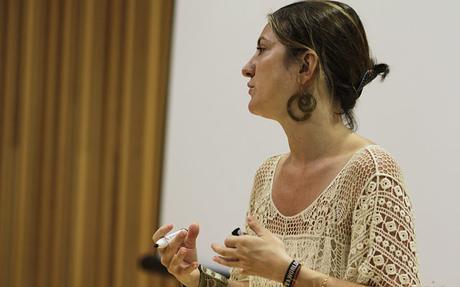
If you struggle in any way at all with public speaking, statistics show that you are not alone. Over 74% of people suffer from some kind of speech anxiety. And yet, speaking in public is part of what is required in the corporate world and a necessary skill if you are to go further in your career.
My story with the fear of speaking in front of others started early. I was a shy, introverted dreamy child and I surprised a lot of my friends by my career choice as an accountant in the corporate world.
There were things that I loved about the corporate environment, like the international travel and the excitement of meeting new people and seeing new places. However, I also had to develop brilliant strategies for avoiding speaking in public, which mainly worked for me.
It was completely different when I took a more senior position as an accountant in the Red Cross South Asia Head Office in New Delhi, India. There was no hiding here. Part of my regular job was giving presentations every few months on the financial situation of the various regional projects.
I would worry about these presentations for a couple of months beforehand and then spend the same amount of time afterwards feeling stupid for yet another 'failure'. As the presentations were at least every six months, this didn't make for a very relaxing or fun life!
Then, to my complete surprise, there was one occasion, in beautiful Sri Lanka, where I suddenly gave a good, confident presentation. At the time, I wasn't sure how I managed to do that, although it did give me the really useful awareness that there wasn't actually something "wrong" with me. Like you and others who suffer from a fear of public speaking, I was not missing the vital 'good at public speaking gene'. It was more that I did not have the information required to speak in front of other people.
Now, years later, with the benefit of my training as a communications and voice expert, I can see the factors that were a contribution to me that day and some others that I would love to share with you. I am not going to talk about knowing your subject well and doing the preparation that is required. That is the starting point that I know you are already doing.
So, here are some pragmatic, simple tools to help you overcome the fear of public speaking, and enjoy success in your career.

Connect with your audience
If you are afraid of public speaking, it is likely that you appear neutral or even disengaged to your audience.
Or you may be trying to impart information to your audience, which means you can appear 'pushy'. This tends to mean your audience becomes defensive and less open to hearing you.
An alternative to being neutral or being pushy is to connect with your audience. You can do this by imagining a connection from behind the audience, through the audience, to you and through you. Perhaps it would help to visualise an imaginary thread weaving between members of the audience. Having this connection makes your audience feel energised, alert and engaged with you, even before you have opened your mouth.
Although this may sound a bit mysterious, it is what a lot of leaders or performers do, without even consciously trying. Somebody like Madonna very naturally does this and it is a technique everyone can learn.
Dress with confidence
Your audience will notice how you are dressed. So, dress for how you would like to be seen by your audience. If this is different from your normal dress, I suggest practicing, wearing these types of clothes at home or when you're out with friends and getting comfortable in them. As you start to feel comfortable in these new clothes, you will already be becoming the person who is confident giving this talk.

Stay present
It can be so easy to drift off, on a stage or even in an important presentation.
Before you even start to speak, I suggest you feel your feet on the ground and breathe down deeply into your abdomen. As well as this, you can expand outwards. By this, I mean simply become aware of what is going on beyond the stage, beyond the room you are in.
As you do this, you are no longer so tightly focussed on the room and the people in the room, which leads to a relaxation in you and in your audience.
Remembering these two simple things will allow you to be present in the room, so people can engage with you and feel your presence, without you becoming overwhelmed.
Fear or excitement?
It is so common to be afraid of public speaking, that we don't even question it. Someone who is confident in this area is absolutely the exception. So, when you feel those bubbles of anticipation in your stomach, when you feel your mind racing, I would like you to ask yourself "is this fear, or is this excitement?"
It is often the case that we have confused excitement and fear. Often, as children, our parents assume we are afraid of something when we are actually really excited. We then assume we must be afraid and act afraid.
Knowing this may be enough to change your situation. It makes sense that you could be excited to get the chance to share something in public.
Beyond this, just know, that even with the physical sensations that may feel like fear, you can carry on and speak with confidence and ease. You can develop the 'muscle of speaking' (or continuing with your life) even when your mind is racing or you have panicky sensations in your body.
Move your body
Speaking is about more than just the voice. It is about the body, too. If there is a lack of confidence in your world around speaking, there is likely to be a build up of tension in your body.
Your hands might shake or you may feel sick in your stomach.
I suggest before you even get to the talk that you stretch your body or do your favourite exercise routine. Sometimes before a talk, I go to the ladies room and just stretch or even jump up and down a bit!
During your talk, you may want to walk up and down as you speak, Keep it slow and natural, or it may appear frenzied.
If you do start to shake, don't worry or make it significant. Your audience will take their lead from you and if you carry on without making it important, your audience will do the same.

Let go of perfection
Our upbringing and our culture gives us implicit and explicit messages that we need to be perfect and that as the 'expert up front', we need to have all the answers. When you are already nervous about giving a presentation, this can lead to additional panic.
Needing to be perfect and have the answers limits what is possible for you, as part of your mind is occupied in checking in to see whether you are getting it right or are already making a mistake!
Of course, be well prepared. That goes without saying, and my guess is that you are already well prepared for your talk.
Just know that if you do make a mistake, you can apologise, smile and move on. If you don't know the answer to a question, tell the audience you will find out for them and get back to them quickly.
Again, your audience will take its cue from you. If you do not make yourself wrong for making a 'mistake' or not knowing the answer to a question, they will not either.
It can be a big relief for the audience to see the speaker able to make a 'mistake' without feeling invalidated - it means that it can be true for them, too.
I hope you find these tips useful and that they can allow you to know that you, too, can speak with ease in front of an audience, and have the success in your career that you desire and deserve.
This guest post was authored by Fiona Cutts

.
Main image credit. Speaker image.
Ms. Career Girl was started in 2008 to help ambitious young professional women figure out who they are, what they want and how to get it.

